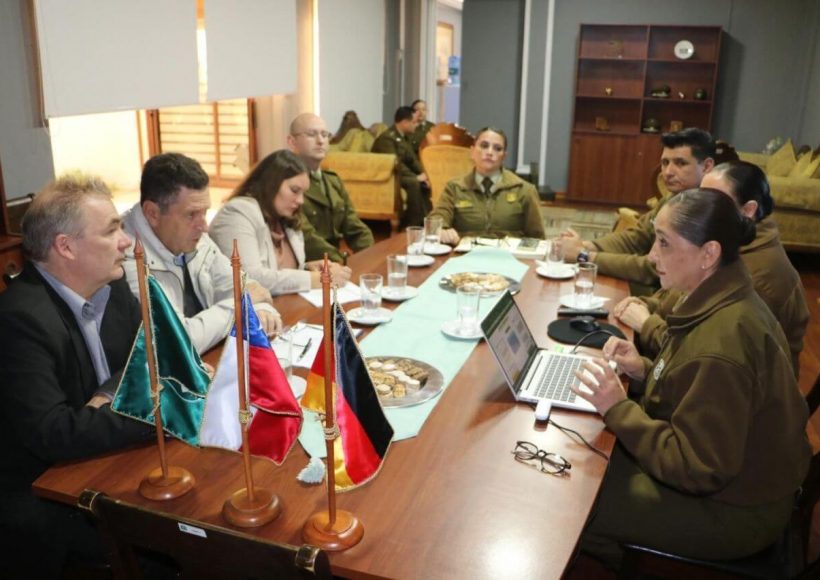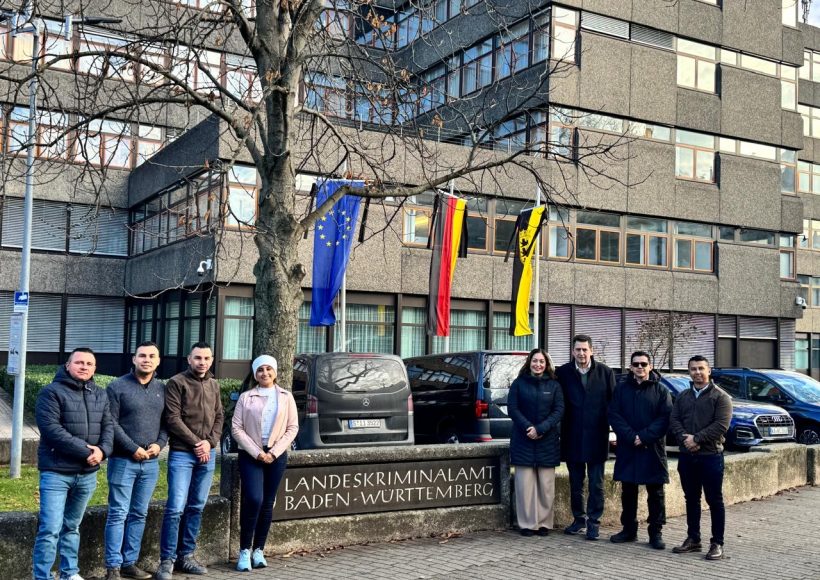Cybercrime is a global challenge that requires trusted international partnerships, technical expertise, and continuity in cooperation.
Advancing Police Reform in Latin America: A Path to Trust and Transparency
We are building trust through modern policing practices, human rights-focused strategies, and community-oriented reforms in Chile and Colombia.
Transforming Police Forces in Latin America
The GS-Foundation is working closely with Chile and Colombia to modernize their police forces, ensuring they uphold human rights, enhance public trust, and promote effective community policing.
Our initiatives focus on de-escalation techniques, gender equality in leadership, and transparent communication strategies. Through targeted reforms, we aim to create safer, more accountable police forces that better serve their communities and set an example for Latin America.
Table of Contents
Transforming Policing Practices in Chile and Colombia
Project Overview
- Goal: Establish a modern, transparent, and community-oriented police in Chile and Colombia, prioritizing de-escalation, human rights, and gender equality.
- Duration: 2019–2026 (GS-Foundation leading since July 2024)
- Comissioning Party: German Federal Foreign Office
- Beneficiaries: National Police of Chile (Carabineros de Chile), National Police of Colombia (Policía Nacional).
- Status: Ongoing
- Photos Slideshow: Carabineros de Chile
Why it Matters
In both Chile and Colombia, societal unrest and protests have underscored the need for significant police reform. Events in Chile in 2019 and Colombia in 2021 revealed allegations of disproportionate force and human rights violations, eroding public trust.
Chile’s government sought Germany’s expertise to modernize the Carabineros, transitioning them into a transparent, human-rights-oriented citizen police force. This model emphasizes de-escalation, effective public communication, and fostering gender equality in leadership.
Similarly, Colombia initiated a police reform inspired by Chile’s transformation and German policing practices. A pivotal milestone was the disbanding of the riot police unit ESMAD and its replacement with UNDEMO, modeled after de-escalation practices in North Rhine-Westphalia.
The outcomes of these projects resonate across Latin America, inspiring other nations to pursue similar reforms.
Our Activities
The projects in Chile and Colombia include the following key components:
Chile
- Reform of the Carabineros de Chile: Focus on proportional, de-escalating responses during public demonstrations.
Training on human rights standards and community engagement. - Leadership and Gender Equality: Programs to promote women in leadership roles within the police force.
Shifts in values and management culture. - Public Communication: Development of a transparent communication strategy, including social media engagement.
- Partnership Building: Continuous collaboration with German and Chilean NGOs to ensure sustainability.
Colombia
- Transformation of Riot Police Units: Replacement of ESMAD with UNDEMO, focusing on non-violent crowd management.
Integration of communication officers into police operations. - Transparency and Public Outreach: High-standard communication practices inspired by Germany.
- Leadership Training: Adaptation of German expertise to align with Colombian policing needs.
Both countries benefit from several tailored reform modules, collaboratively developed and implemented with multiple German Federal State polices. These modules address organizational structure, training, and operational practices, ensuring alignment with local needs.
Goals and Impact
The police reforms underway in Chile and Colombia are designed to build more modern, transparent, and accountable law enforcement institutions. By adopting de-escalation strategies and improving operational effectiveness, both countries are strengthening their ability to manage public demonstrations and civil unrest in a manner that respects human rights and fosters peace.
Promoting gender equality in leadership positions within the police forces is a key element of these reforms, ensuring that decision-making processes are more inclusive and reflective of the broader society. This shift not only improves operational efficiency but also contributes to a more diverse, balanced, and effective police force.
Enhanced transparency and improved communication with the public are central to building trust between law enforcement and the communities they serve. As these reforms progress, they will result in more responsive, community-oriented policing, reinforcing the rule of law and democratic principles. Ultimately, these efforts will contribute to long-term stability, improve public safety, and help establish a policing model that can serve as an example for other countries in the region.
Our dedicated team


GS-F News
from Chile & Colombia
 CategoriesChile and Colombia
CategoriesChile and Colombia Police Reform in Chile: Strengthening Values, Dialogue and Human Rights
At the beginning of September, our colleagues Ronja Berner and Udo Möller travelled to Chile as part of the trilateral…
 CategoriesChile and Colombia
CategoriesChile and Colombia Reflections on Our First Delegation Visit to Colombia
Bogotá, May 2025 – In early May, the GS-Foundation had the opportunity to accompany the German Federal Foreign Office on…
 CategoriesChile and Colombia
CategoriesChile and Colombia Strengthening International Cooperation for Modern Policing in Chile and Colombia
The Moldovan delegation recently took significant steps to strengthen international collaboration in law enforcement.
 CategoriesChile and Colombia
CategoriesChile and Colombia Leadership in Action: Strengthening Values & Perspectives with Policía Nacional de Colombia
Leadership seminar with Policía Nacional de Colombia: Five days of training on values-based leadership, communication, coaching, and modern police work.
 CategoriesChile and Colombia
CategoriesChile and Colombia Kick-Off for Trilateral Police Collaboration in Chile and Colombia
In October, we embarked on a significant delegation trip to Chile, marking an important step forward in a trilateral police…


